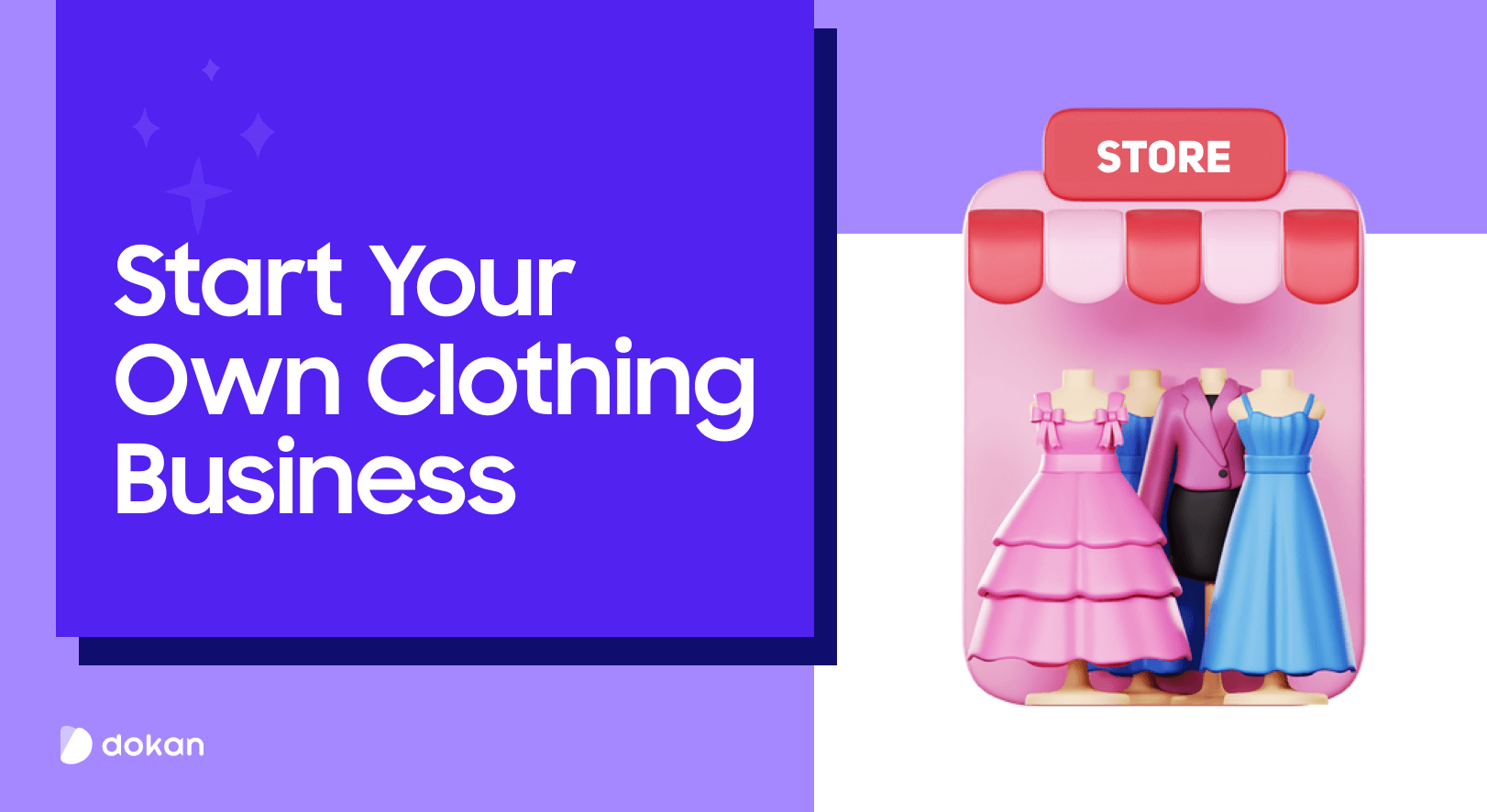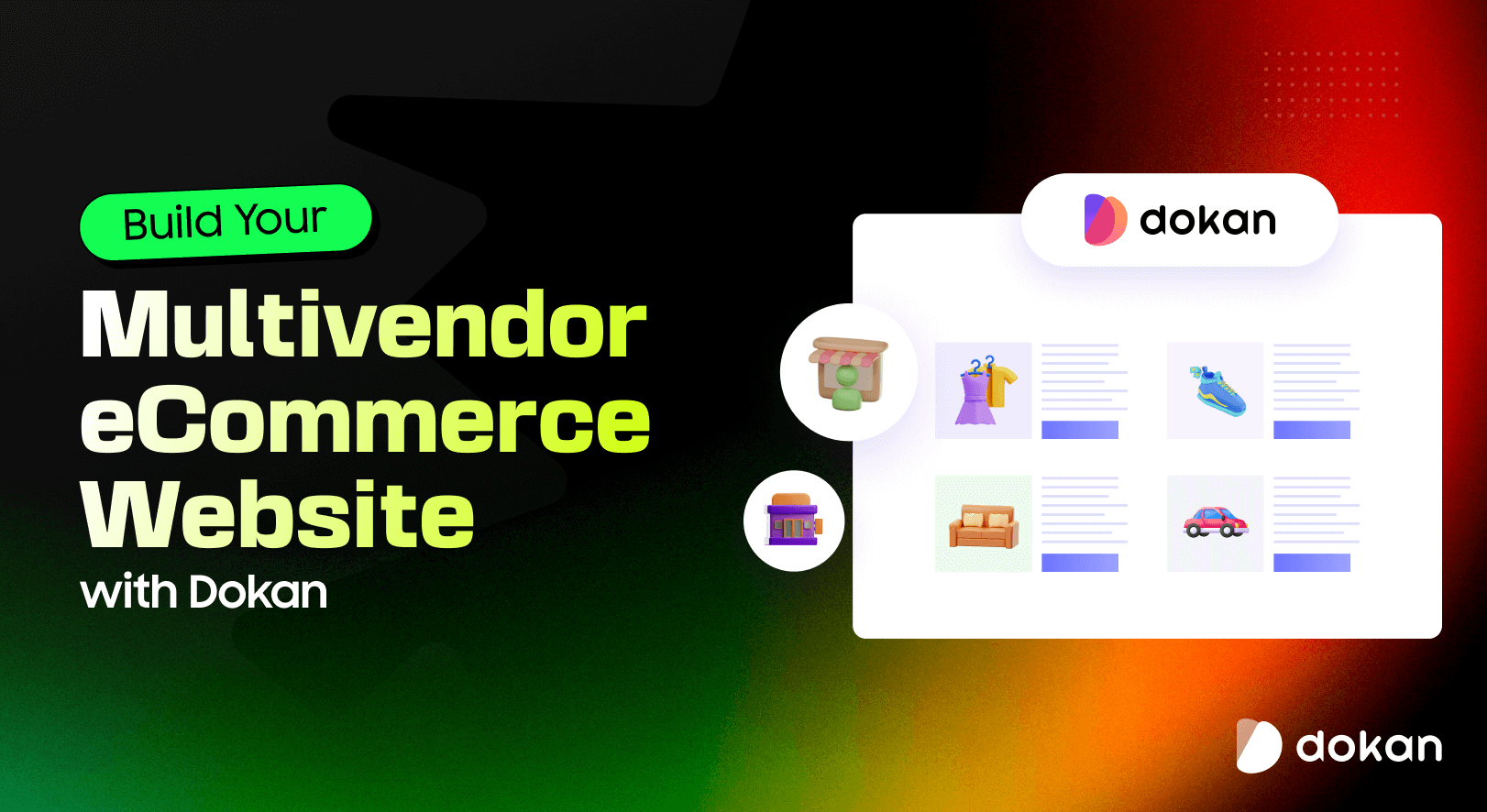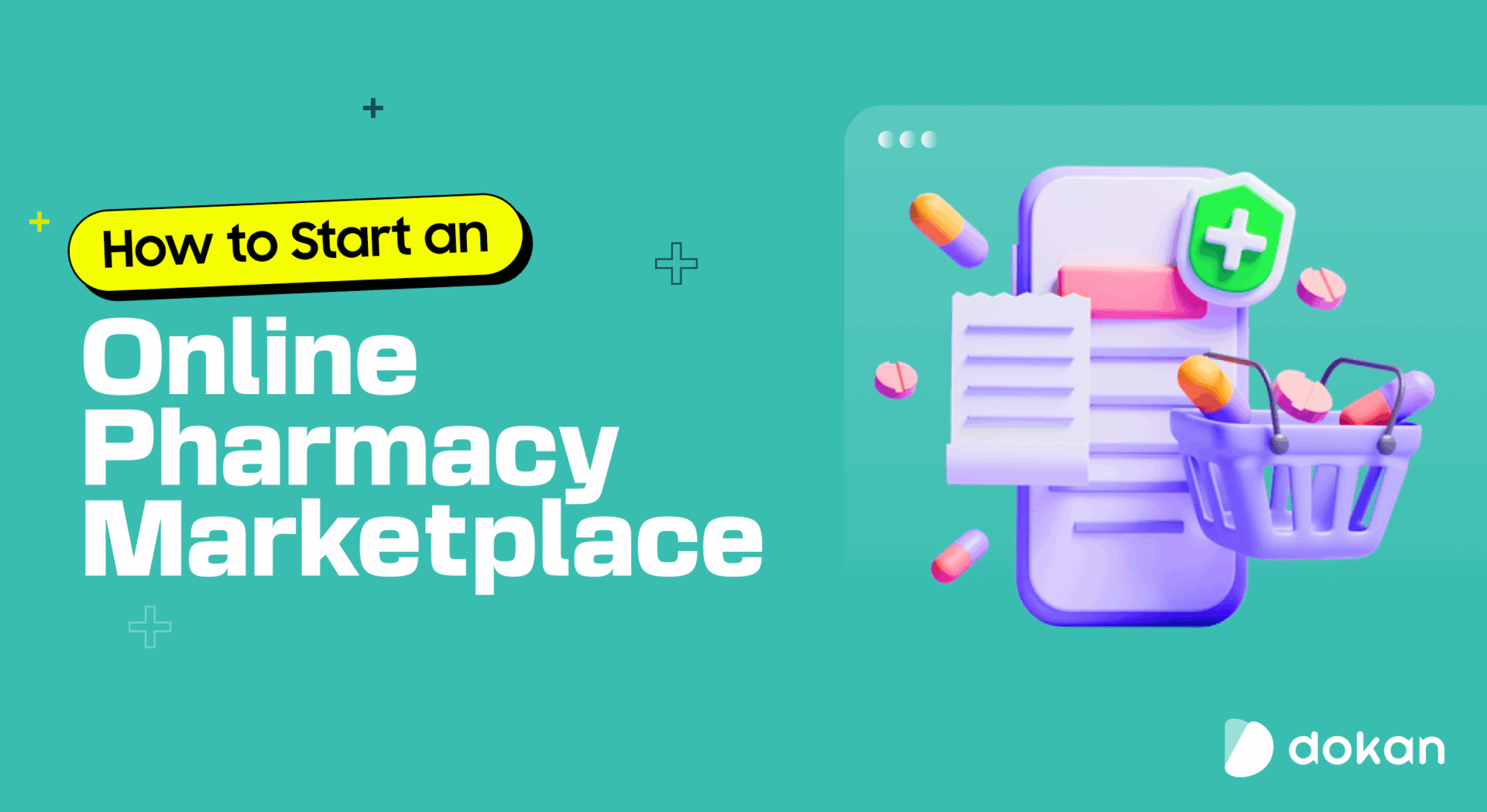A marketplace is where you can find a lot of people selling different goods. You can purchase whatever you want there if available. This may be the very first image that pops up in our heads when we think of it. However, the idea got bigger over time.
Today we’ve physical marketplaces as well as online marketplaces. And, the latter is rising each year-
As online shopping accounted for 5 trillion U.S. dollars of global retail sales in 2021, a figure expected to exceed 7 trillion U.S. dollars by 2025.
Statista
So if you are up to it, you need to understand the whole thing thoroughly.
Don’t worry. In this blog, we are going to help you with that. After you have finished reading, you will learn what is a marketplace, its history, the key differences between different types of marketplaces, and how to build one with best practices.
Let’s get started!
What is a Marketplace?

Usually, a marketplace sells almost anything that may vary from furniture to dog foods. It is a location (physical or online) where people gather, and exchange goods or services. You can sell something or make purchases in a marketplace.
Precisely, a supermarket with lots of outlets can be a marketplace. On the other hand, Amazon.com is also a marketplace, although it’s online-based.
Well, you might have already realized that we are going to focus on the online marketplace here.
What is an Online Marketplace?
An online marketplace is an internet-based platform (website or application), where multiple buyers and sellers trade (buy/sell) or exchange their products and services.
An online marketplace is also known as an eCommerce marketplace, multivendor marketplace, or multivendor eCommerce.
An online marketplace is a website or app that facilitates shopping from many different sources. The operator of the marketplace does not own any inventory, their business is to present other people’s inventory to a user and facilitate a transaction.
Forbes
As you can understand, the marketplace owner doesn’t necessarily have any inventory themselves. They just create a platform for the sellers and manage it. In return, the marketplace owners or operators usually charge a fee to the sellers.
Example: Some of the popular online marketplace examples are Amazon, Alibaba, Upwork, Airbnb, Coursera, etc.
eCommerce Store vs Online Marketplace- Is There Any Difference?

Electronic commerce, in short eCommerce, is the business of buying and selling goods and services on the internet. Depending on the number of sellers or vendors, there are 2 different types of eCommerce platforms:
- eCommerce store, or online store, or single online store
- eCommerce marketplace, online Marketplace, or multivendor marketplace
The main difference between eCommerce and an online marketplace is that – an online marketplace is a kind of eCommerce venture. All online marketplaces are eCommerce platforms, but all eCommerce platforms aren’t online marketplaces.
Now, let’s clear the confusion between an online store and a marketplace.
An online store is an internet-based store (website or application) where one company/individual trades their goods or services. That’s why it is also identified as a single online store sometimes. Examples: ASUS Store, Pizza Hut, Nike, H&M, etc.
In a Marketplace, on the other hand, multiple parties (multiple vendors and buyers) are involved. That’s why online marketplaces are also called multivendor marketplaces. Examples: Amazon, eBay, AliExpress, Uber, Etsy, Airbnb, etc.
We’ve pointed out 6 major differences between a single store and a marketplace. Let’s check them from this table.
| Features | eCommerce Store | eCommerce Marketplace |
|---|---|---|
| Definition | An eCommerce store is a website that sells products from a single vendor to multiple customers | A marketplace is a website that sells products from multiple sellers to multiple customers |
| Parties | Buyers and sellers | Marketplace admin, buyers, and sellers |
| Inventory | Maintain an inventory | Do not maintain an inventory |
| Cost | Need budgets for buying hosting and creating a website | Just need to pay commissions |
| Traffic | You’re liable to attract traffic to your store | Already there is traffic for the marketplace |
| Example | Nike, Allbirds | eBay, AliExpress, Walmart |
Related: Online Store vs. Marketplace: Everything You Need to Know
A Brief History of Online Marketplace
The concept of online selling was born in 1979, which was even before the invention of the World Wide Web (the Internet we know today) in 1989.
However, the first true implication of the online marketplace took place several years later in the 1990s, thanks to Book Stacks Unlimited and Pizza Hut for introducing online ordering systems in 1992 and 1994 respectively.
In the following years, the idea of an online marketplace started to gain some popularity, which eventually laid the foundation of the eCommerce industry. Next, online marketplaces just got more and more popular and mature every year.

Timeline of Online Marketplace- Since 1979
Now, we are going to let you know some notable events in the eCommerce industry briefly in the following timeline. This will help you understand the history and evolution of the online marketplace better.
- 1979: British entrepreneur Michael Aldrich invented online shopping
- 1992: Book Stacks Unlimited was launched as the first online marketplace
- 1994: Marketplace giant Amazon was founded; Pizza Hut introduced online ordering
- 1995: Another online marketplace giant eBay was launched
- 1996: Global online sales surpass $1 billion/year
- 1998: PayPal was launched as the first eCommerce payment system
- 1999: Chinese eCommerce giant Alibaba was founded
- 2000: Google introduced AdWords as an online advertising tool
- 2003: Apple launched iTunes, the first major eCommerce for digital products
- 2004: Shopify was launched, and one of the top marketplace builders at present
- 2005: Etsy was founded, and the first Cyber Monday sales campaign was introduced
- 2008: The era of mobile commerce has begun with the first mobile purchase
- 2011: Stripe and Google Wallet were introduced as new e-payment methods
- 2012: Global eCommerce sales hit $1 trillion/year for the first time
- 2016: Facebook launched Marketplace, revolutionizing social eCommerce
- 2017: Cyber Monday sales exceeded $6.5 billion, setting a new landmark
- 2020: Covid-19 dominated eCommerce growth (both positively and negatively)
- 2021: Global eCommerce market size reached a value of $13 trillion
- 2022: The Chinese eCommerce market has become the biggest eCommerce market in the world
- 2023: The total retail sales worldwide is expected to rise to $29.7 trillion, marking an increase of 5.5% from 2022
- 2024: U.S. B2B marketplace sales are projected to grow by 35%
Currently, online marketplace leaders are placing emphasis on enhancing the user experience by introducing various modern technologies, like AI, AR, omnichannel, and video shopping.
Online Marketplace Advantages and Disadvantages in Short

Online marketplaces have made our lives easier. Just think about how frequently you use services like – online food delivery, ride-sharing, video, and music streaming – every day.
However, it doesn’t mean the marketplaces come with advantages only. They have some disadvantages as well. We will discuss both in the following points:
Advantages of Online Marketplaces
- Makes buying and selling goods and services easy, fast, and affordable
- Allows companies/sellers to internationalize their businesses
- Ensures 24/7 trading as the marketplace is always online
- Selling products online is more cost-efficient than in physical stores
- Buyers can get a low rate and enjoy various discounts
- Creates transparency in availability, stock levels, and prices
- Building an online marketplace is easy and convenient
Disadvantages of Online Marketplaces
- Difficult to manage, especially if the marketplace is huge
- Hard to predict the product or service quality
- Sellers sometimes don’t enjoy full freedom
- Huge competition (both internal and external)
As you noticed that online marketplaces have a very limited number of disadvantages, compared to what they are offering. If any marketplace can overcome the disadvantages, it’s almost certain that it will be successful and popular.
Types of Online Marketplaces Explained

Online marketplaces are mainly three types depending on the target audience. They are –
- Business-to-Business (B2B) Marketplace
- Business-to-Customer (B2C) Marketplace
- Peer-to-Peer (P2P), or Customer-to-Customer (C2C) Marketplace
Also, based on what would be sold in a marketplace, there are 3 other kinds –
- Online Product Marketplace
- Online Service Marketplace
- Online Rental Marketplace
Well, let’s explore them one by one.
1. B2B Marketplace

Business-to-business or B2B marketplace is the type of online marketplace where companies/businesses trade their goods or services with other companies/businesses. B2B marketplaces are also known as online wholesalers.
In terms of B2B, both the buyers and sellers are companies or business organizations. The number of sales is comparatively low here, but each sale usually contains a large number of products and a big amount.
Examples: Alibaba.com, Amazon Business, Global Sources, IndiaMART, General Electric, etc.
2. B2C Marketplace
Business-to-customer or B2C marketplace is the type of online marketplace where companies/businesses sell their goods and services directly to the consumers without any middle person/medium. B2C marketplaces are also known as online retailers.
B2C is the most common and popular form of eCommerce. The number of sales is huge in B2C as it shares the largest portion of the customers, more than 90%.
Examples: Amazon, AliExpress, Best Buy, App Store, etc.
3. P2P or C2C Marketplace

A Peer-to-Peer or P2P marketplace is a type of online marketplace that connects people with one another to trade their goods and services. Usually, this type of marketplace operates without the involvement of a third party.
Here, trade and transactions are held between customers. That’s why it is also called customer-to-customer or C2C marketplace.
Examples: Etsy, Uber, Airbnb, Taobao, Craigslist, etc.
Don’t get confused: Some companies here cover more than one, even all three marketplace models. For instance, companies like Amazon and Alibaba Group cover all three – B2B, B2C, and P2P – while eBay covers B2C and B2C.
4. Product Online Marketplace
Product marketplaces are the type of online marketplaces, where physical, virtual, or downloadable goods are sold. It is the most common type of marketplace in this category.
Examples: Amazon, Alibaba, eBay, Etsy, App Store, Steam, etc.
5. Online Service Marketplace

Service marketplaces are the type of online marketplaces, where services – like digital subscriptions, training, online outsourcing, or ride-sharing – are sold. It is the fastest-growing among all types of marketplaces.
Examples: Uber, Spotify, Netflix, Upwork, Fiverr, Coursera, Udemy, etc.
6. Online Rental Marketplace
Rental marketplaces are the type of online marketplaces, where individuals/companies can give or take rent different types of products, accommodations, or places to/from one another.
Examples: Airbnb, Booking.com, TripAdvisor, Student.com, etc.
Now let us share a few online marketplace features that will help you get a more clear answer to the query- What is a Marketplace?
Related: Vertical vs Horizontal Marketplace – Everything in 10 Minutes
10 Must-Have Online Marketplace Features

You might wonder how Amazon, eBay, and Alibaba became so successful. The features of their marketplace played a big role, apart from their dedication and business strategies.
Therefore, we can say, that not only usability but also the success of an online marketplace is dependent on how it was built, and what type of features it offers. So, the must-have features for an online marketplace are:
- Responsive Design
- Accessibility and Mobile Friendliness
- Powerful Search Options
- Layered Product Navigation
- Online Payments
- Reviews and Ratings
- User Accounts and Profiles
- Social Sharing
- Chat and Email Integration
- Admin Functionality
Now, we are going to talk about the features in detail with the necessary visuals and evidence. Let’s check them out.
1. Responsive Design

The design of a marketplace is the key to grabbing customers’ attention and enhancing the user experience. If your marketplace isn’t fast and responsive, the visitors will leave your site and go somewhere else – meaning you’ll face bounce rates.
The probability of bounce increases 32% as page load time goes from 1 second to 3 seconds – Google
Every second the site loads faster; the conversion rate improves by 17% – Bidnamic
So, it is very necessary to build your marketplace from a platform that offers attractive, fast, and responsive design.
2. Accessibility and Mobile Friendliness
A good marketplace site should be accessible from all devices, particularly mobile. Because –
About 72.9% of total global online shopping is done via mobile devices at present – Statista
Can you believe how much influence mobile commerce has on the eCommerce industry? Therefore, it is a must to choose the platform that will help you make your marketplace site mobile-friendly.
3. Powerful Search Options
Let’s say you have the product a customer is looking for. But the customer couldn’t find it on your marketplace. To avoid such embarrassment, a marketplace should have a powerful search feature integrated into it.
4. Layered Product Navigation

This feature enhances products’ search experiences. It helps customers find a product easily based on category, price range, color, size, or any other available product attribute.
5. Easy Payments Gateway
We are now living in the era of the digital revolution. Therefore, it is mandatory for each marketplace to have online or electronic payment systems – like PayPal or Stripe – regardless of whether it has a traditional payment method or not.
6. Reviews and Ratings
Reviews and ratings are important elements to build trust among customers. They will help gain the reputation of your marketplace and the vendors as well. So, the marketplace owners or operators should make sure that they have this feature.
7. User Accounts and Profiles
To manage the marketplace and maintain the transaction processes, an eCommerce site should have account creation and login features for both the sellers and customers. With the help of the accounts, customers will also be able to create their wish lists.
8. Social Sharing
I think it’s unnecessary to let you know the importance of having this feature. All we can say – if you want to promote your marketplace, you must have this feature.
9. Chat and Email Integration
Both buyers and sellers usually don’t meet in real life while trading on an online marketplace. So, there is a trust and communication gap. Chat and email integration can overcome it to some extent.
10. Admin Functionality
The sellers on an online marketplace need to have control over everything that happens in their store. So, this feature will help marketplace operators attract vendors to get enlisted in their marketplace.
Hope you’re now more clear about What is a Marketplace and how an online marketplace works.
Online Marketplace Trends to Follow in 2025
Knowing the current trends in the eCommerce marketplace industry would help you identify the challenges and opportunities both present and the future to keep you ahead of the competition.
The current online marketplace trends are mostly associated with modern technologies and their adaptations. You will have a better idea if you check the top trends below:
- Niche-Specific Marketplace
- Integration of B2B and B2C
- The Dominance of Mobile Commerce
- Wide Adaptation of Artificial Intelligence
- Inclusion of Augmented and Virtual Reality
- Mature Social Media Commerce
- Focus on Omnichannel Selling
- Influence of Sustainable Practices
- Versatility in Payment (Cryptocurrencies)
Learning and adopting marketplace trends is particularly important for eCommerce owners and operators. Because your success is largely dependent on how fast you learn and adopt those trends, and how innovative and dedicated you are.

Bonus 01: Is WordPress Good for Online Marketplaces?
Launching an online marketplace has become comparatively easier after the arrival of WordPress. You don’t have to write codes to create a marketplace from scratch using WordPress. The first barrier to creating something online is coding, but if you’re using WordPress, you have already surpassed a barrier.
WordPress has a dedicated plugin called WooCommerce for creating eCommerce websites. And it’s the most used solution by far for eCommerce websites.
Data shows WooCommerce is the leading eCommerce platform with 23.39% of the market share worldwide.

So, it’s certain that the popularity of WooCommerce isn’t a fluke, it serves people with advanced features to facilitate eCommerce platforms. That is why so many people are using WordPress and WooCommerce.
And to turn your eCommerce website into an online marketplace, there are solutions from WordPress as well. There is a WordPress plugin called Dokan for creating online multivendor marketplaces.
All you need to do is install WordPress on your cPanel, install WooCommerce, and finally install Dokan to create your marketplace. It’s as simple as that!

Subscribe to
Dokan blog
Bonus 02: Top 5 Trendy Online Marketplace Ideas for You
If you want to launch your own online marketplace, regardless to say, you should find a niche that is trendy and profitable. In this segment, we are going to discuss the top 5 trendy online marketplace ideas that could be profitable for you.
- General eCommerce Marketplace
- Service Marketplace
- Learning Marketplace
- Health & Wellness Marketplace
- Food Ordering Marketplace
I) General eCommerce Marketplace
An online eCommerce marketplace is a platform where buyers can discover products from multiple third-party sellers, allowing buyers to purchase directly from the vendors. In short, it connects buyers and sellers of physical goods. Some profitable online eCommerce marketplace ideas are:
- Fitness equipment
- Pet food and toys
- Fashion and beauty
- Gadget and technology
II) Service Marketplace
An online services marketplace is a platform where customers can discover services from multiple third-party service providers who can be individuals, professionals, or companies. These are generally vertical marketplaces that focus on a niche service.
Some profitable online service marketplaces are:
- Freelancing service
- Home and cleaning service
- Mechanic service
III) Learning Marketplace
Online learning also known as the eLearning marketplace is a platform where students or learners can take education offered by various course providers. Online learning marketplaces are generally focused on a niche category, also called the vertical marketplace.
Some trendy online learning marketplaces are:
- Courses
- Tutoring
- Training
IV) Health & Wellness Marketplace
Online health and wellness marketplace connects healthcare providers with seekers. Experts forecast that in the coming years, telehealth will become a common complementary service to traditional in-person visits.
By 2025, more than 43% of the US population is expected to become regular telehealth users.
Some health and wellness marketplace ideas are:
- Health consultation
- Medicine delivery
- Yoga, meditation, or fitness training
V) Food Ordering Marketplace
An online food ordering marketplace is a platform where restaurants or home chefs can list themselves and consumers can order food from those providers. The food providers put out their menus and consumers can get their food delivered to their doorstep.
Some trendy online food ordering marketplace ideas are:
- Food ordering platform
- Hospital, office, or airport food delivery platform
These are the most trendy and profitable online marketplace ideas now. You can choose one option from here or can come up with new ideas by brainstorming. But don’t forget to make sure your chosen niche has demand in the market.
Related: 9 Online Marketplace Ideas for You to Succeed
What is a Marketplace- End Note
If you are already an entrepreneur or want to become one, the online marketplace could be one of the best places to invest. Our habit of online shopping is nothing but rising since the coronavirus pandemic only accelerated the growth.
Moreover, building an online marketplace is much easier nowadays, and it is also very cost-efficient. You can even build an entire marketplace without writing a single line of code or having vast tech knowledge.
So, what should be your game?
We believe we’ve covered all the frequent queries that come up in your mind regarding what is a marketplace. If you want to learn more, let us know in the comments section.
Subscribe to
Dokan blog
We send weekly newsletters, no spam for sure!






Leave a Reply